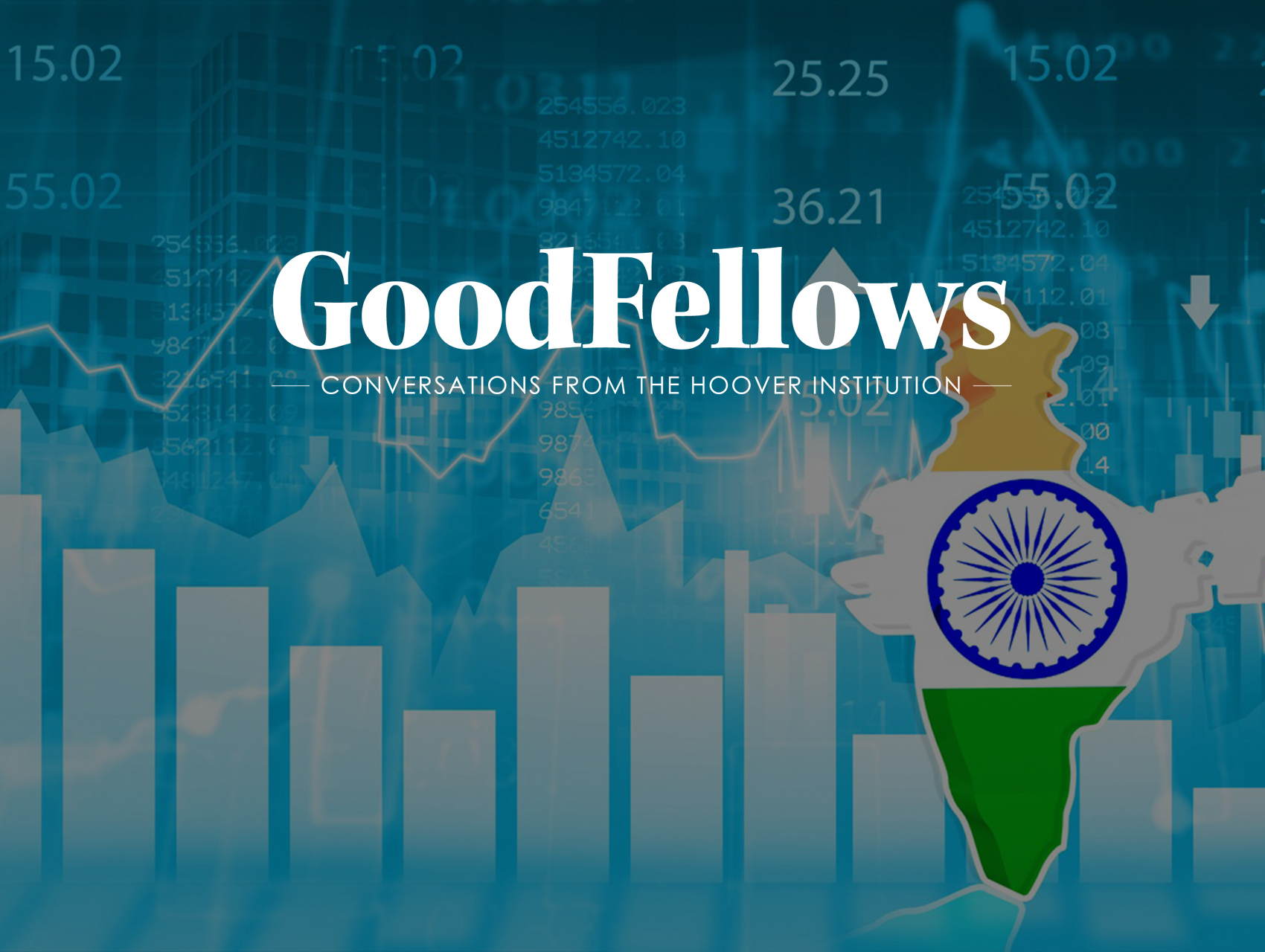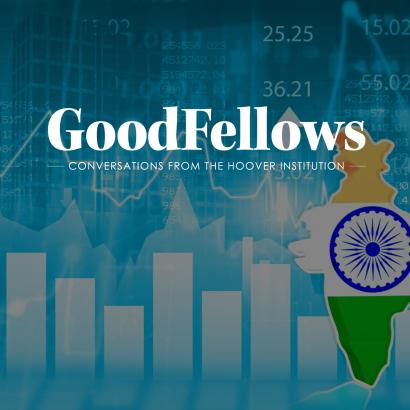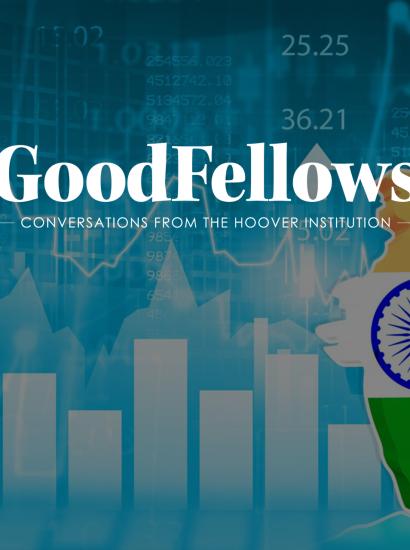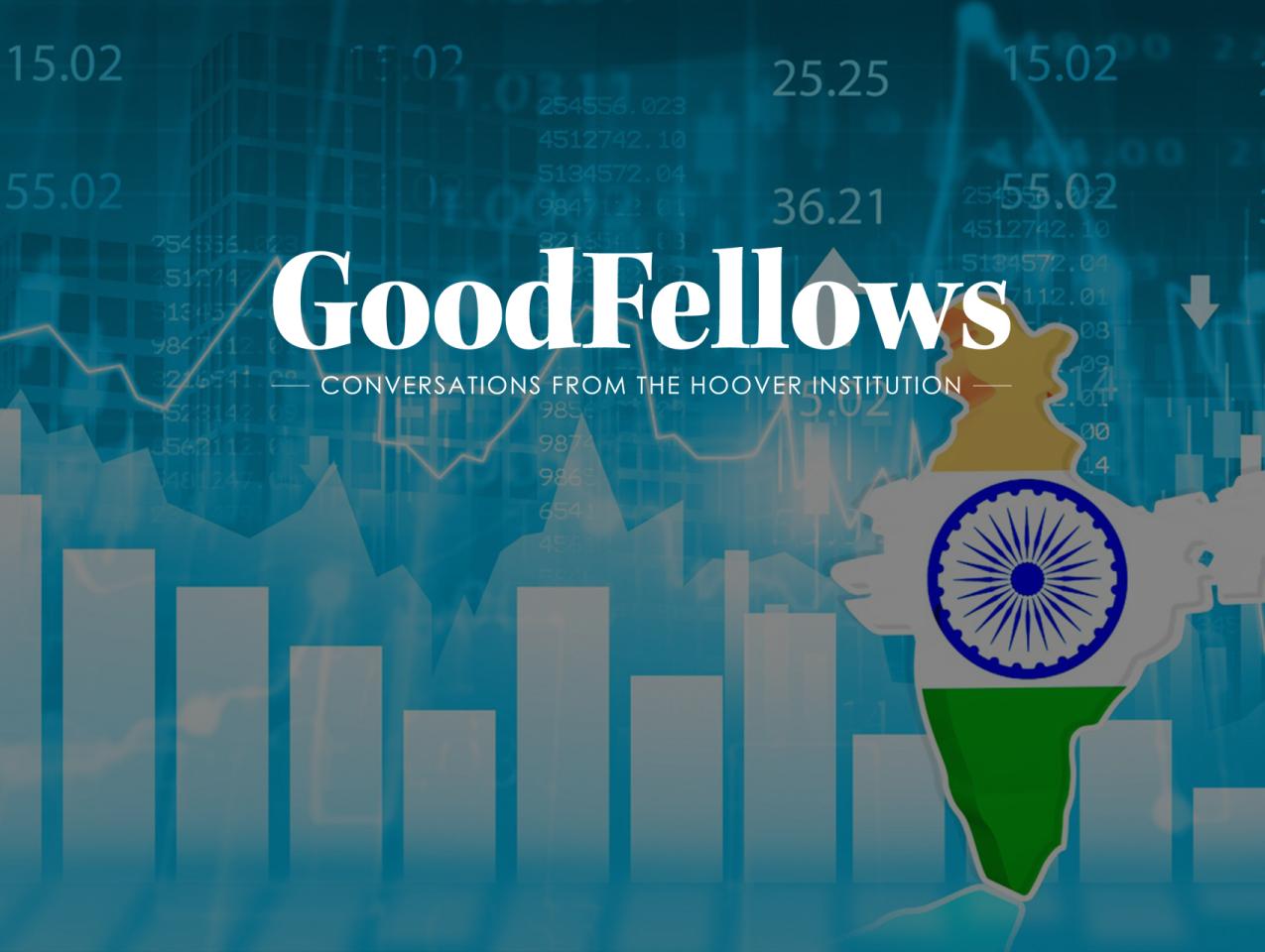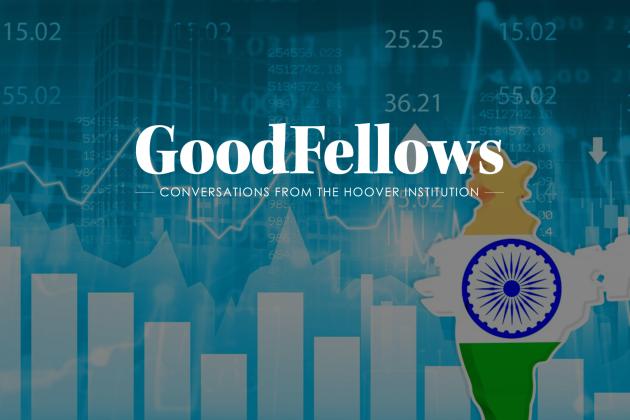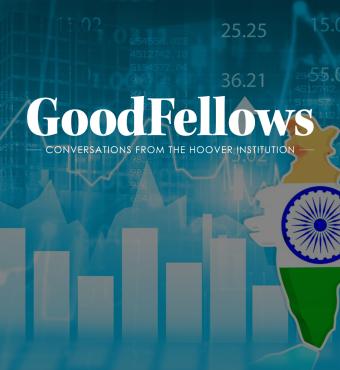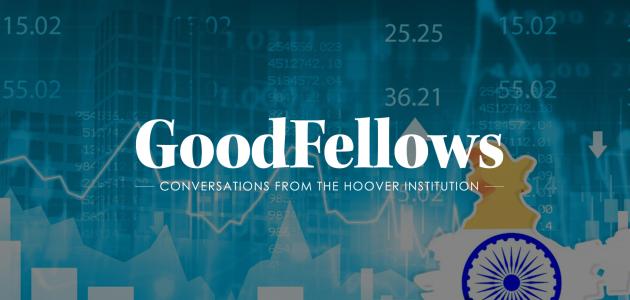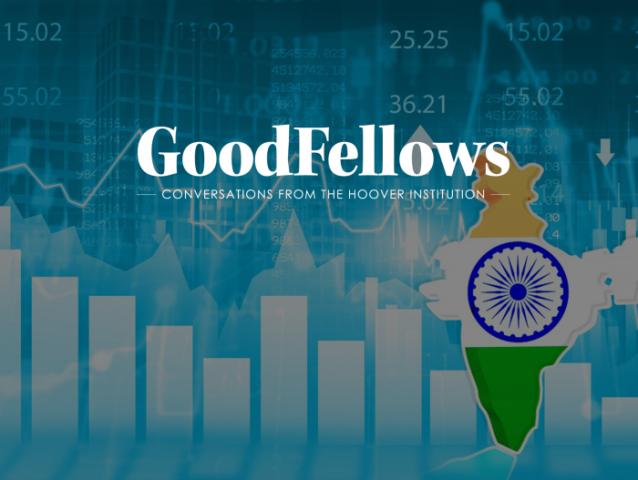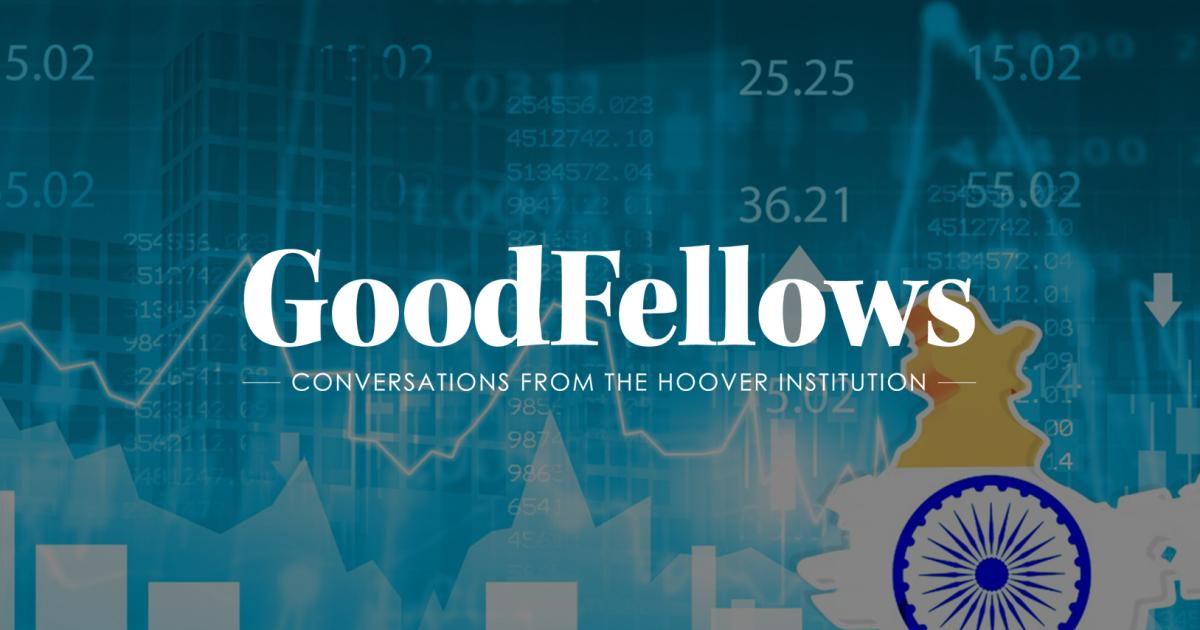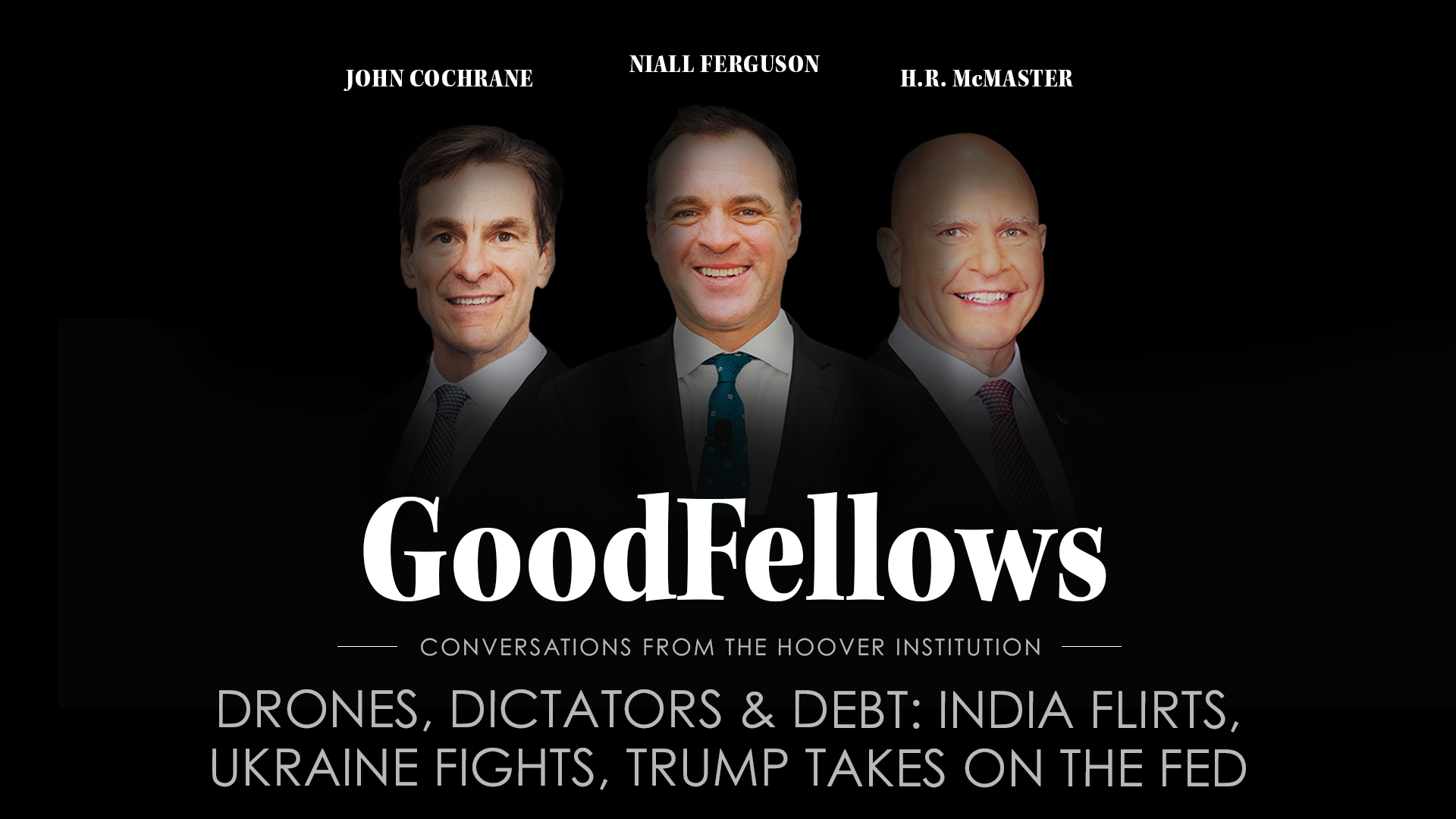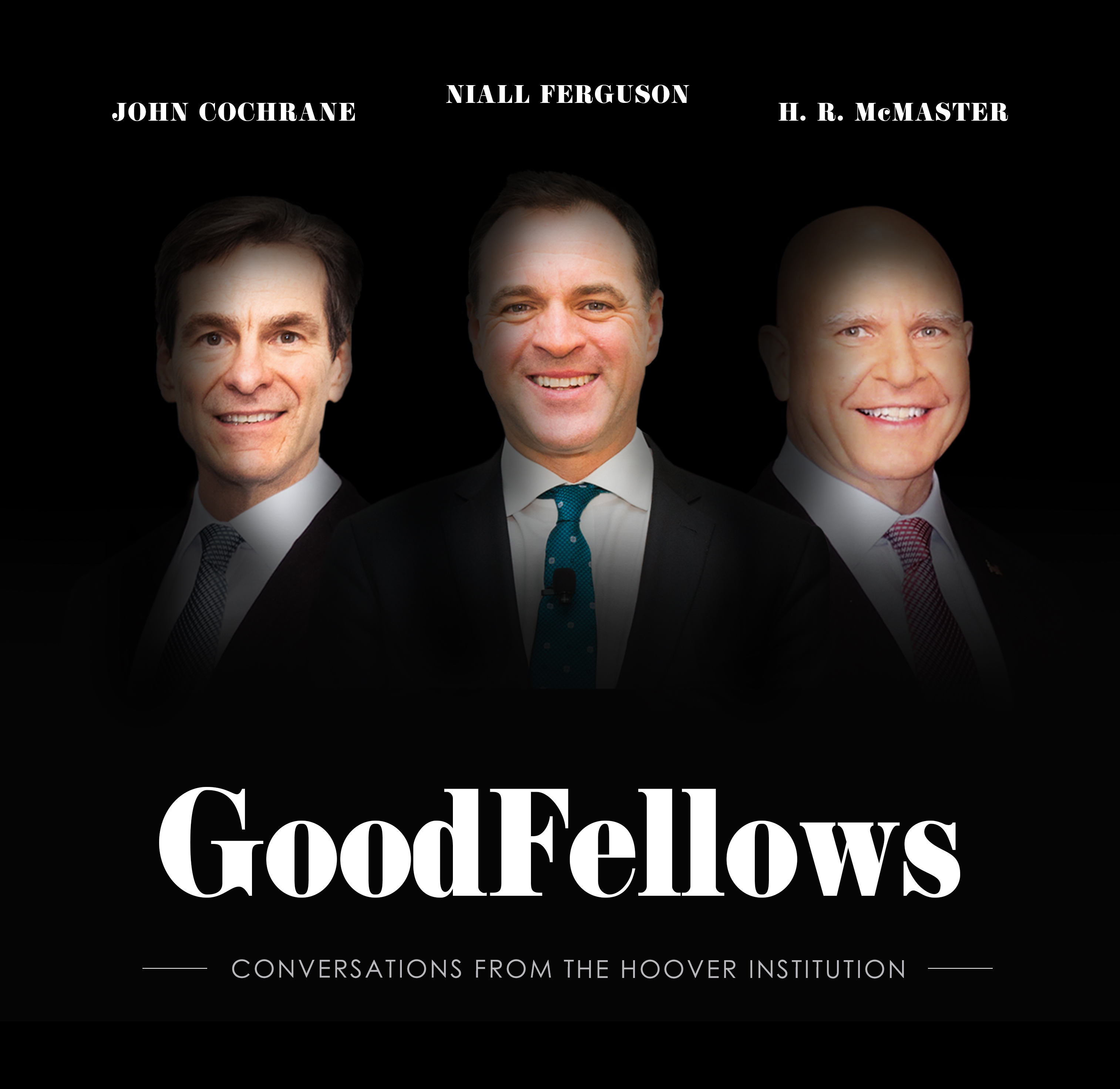- International Affairs
- US Foreign Policy
- Indo Pacific
- The Presidency
- History
- Politics, Institutions, and Public Opinion
- Determining America's Role in the World
Hoover senior fellows Niall Ferguson, John Cochrane, and H.R. McMaster discuss the significance of Modi’s summitry with Vladimir Putin and Xi Jinping. This leads into a broader conversation about Ukraine’s durability (with Niall soon to visit Kyiv), as its conflict with Russia becomes a predominantly drone war. Also discussed: the question of power-wielding in Washington—the American president derided as a modern-day fascist for his use of executive authority; the differences between Trump Derangement Syndrome in the past versus the present; the Federal Reserve’s independence (and sprawl); plus the merits of the federal government taking a 10% equity stake in chip manufacturer Intel. Finally, some bad news for our London fans: While the GoodFellows will be gathering in the UK’s capital city, there are no plans for a rooftop concert à la the Beatles atop their Apple Corps building.
>> Bill Whalen: Hi, this is Bill Whalen from Goodfellows. The Hoover Institution is proud to announce two national competitions honoring the life and work of Thomas Sowell, one of the most influential public thinkers of our time. For high school and college students, the Thomas Sowell Essay Contest is a chance to engage deeply with his ideas, whether by applying them to a pressing issue in society or by reflecting on how Dr. Sowell's writings have shaped your own worldview.
For creators of all kinds, the Multimedia Creator competition invites bold, thoughtful storytelling in video form no longer than three minutes, responding to a simple but powerful question. What lesson or teaching for Thomas Sowell do Americans most need to learn or remember today? Each winner will receive $5,000 plus a paid trip to the Hoover Institution here at Stanford University for a special celebration in Dr. Sowell's honor.
Details and submission links are available at the following URL, hoover.org/ thomas-sowell-legacy. I'm gonna repeat that, hoover.org/thomas-sowell-legacy. Good luck. We hope to see you here at Hoover in the near future. It's Thursday, September 4, 2025. And welcome back to Goodfellows, a Hoover Institution broadcast examining social, economic, political, and geopolitical concerns.
I'm Bill Whalen. I'm a Hoover Distinguished Policy Fellow, and I'll be your moderator today. This is the first Goodfellows episode of the new academic year here at Stanford. And I'm pleased to report that all of our Goodfellas are in attendance today. That would include, of course, the historian Sir Neil Ferguson.
Hello, Neil. The economist John Cochran. And joining us from the Washington D.C. office, the Hoover Institution, former presidential national security advisor, Lt Gen. H.R. McMaster. Niall, John, and H.R. are all Hoover senior fellows. So, gentlemen, usually our producer, Scott Immergut, and I kind of offer you a set menu of what we want to talk about, but today we're going to throw it back to you and let you sort of choose in the buffet what you want to bring up.
Let's have a freewheeling conversation. H.R., let's start with you. I know you want to talk foreign policy. I read your latest piece in your Substack history. We don't know where you talk about India's Prime Minister, Mr. Modi, who you know, who you've met, who you've talked to before, you know that four days after Mr. Modi received sanctions from the Trump administration for buying oil from Russia, Mr. Modi takes it upon himself to go to China to meet with Putin and Xi jinping and about 16, 17 other countries.
Here's my question, H.R., when we see what Modi is doing, this strikes me as maybe kind of high school in this regard. Is this kind of the classic high school move where you hang out with somebody else to make your boyfriend jealous, or is this the beginning of a General Bromance between Mr. Modi, Mr. Putin, and Mr. Xi Jinping?
>> H.R. McMaster: Well, actually, if you look at the long history of US-India relations, it's not aberrational, it's consistent, I think, with what I described in that piece as India's schizophrenia between fear of abandonment and fear of entrapment, right? The legacy of the Non-Aligned Movement and so forth, and the long relationship that India's had with Russia.
And that relationship's deeply rooted within the Indian military. It was almost wholly reliant on Russian weapons, for example, and of course, the access to cheap energy. And so India, I think, feels aggrieved at this point and feels both abandoned and has this fear of entrapment at the same time.
And that's driving them kind of away from us and back into the orbit of Russia, who India believes it needs to hedge against a hostile China and a hostile Pakistan and the China Pakistan relationship, which is now almost a servile relationship that Pakistan has with China, both nuclear armed, by the way.
And so also India thinks it can buy some time with this rapprochement with Beijing. So as I mentioned in the essay, though, I think gravity was in our favor in terms of India recognizing that its long term interest lies with free market economies and representative governments like their own, and does not lie with this axis of aggressors, which was on display in terms of displays of power with the parade, the People's Liberation army parade, commemorating the 80th anniversary of what they portray as China's defeat of Japan in World War II.
I mean, the whole, you know, just the whole warping of history was astounding. But I think just like, just like the parades in Moscow, prior to the disastrous Russian invasion of Ukraine, I think that these, these regimes, they appear strong on the outside but they've got real problems.
So, Bill, I would just say that was my topic to talk about. Thanks for introducing it. I mean, it's really the geopolitical dynamics today associated with reaction to the Trump administration, but also the degree to which this axis of aggressors is actively trying to recruit a sphere of influence, right?
That it can use to counter critical elements of US Power, including the dollars of the reserve currency, including US Military power and Xi Jinping's statements, I think are really worth reading, as Frank Decoder told us, right? It's important to read primary sources coming from the Chinese Communist Party and those primary sources integrated degree of hostility.
And that's what President Trump responded to with that tweet, which kind of, I got to confess, I kind of loved it. You know, I thought it was just so Donald Trump, but just calling them out, like as you're conspiring against us, you know, we see what you're doing.
So anyway, I think what this is going to provide is impetus for President Trump to take a tougher approach to China because he's been really kind of soft on China, with this, with the H20 exports, with a bunch of other decisions in connection with trade, because he's hoping for the big deal and he's going to be tougher on Russia.
And you saw with his statements recently. And again, I think what's in our favor, Bill, and for Neil and for John, what's in our favor is the intransigence of these authoritarian leaders. I think they're going to help convince President Trump to in the end have pretty effective policy approaches toward them.
>> Sir Niall Ferguson: HR Can I push back gently? Because it seems to me that, that what's going on or what went on in China was, was pretty empty as far as India was concerned. It was, it was symbolism. There was no substance to it. And I, I'm not sure how big a discontinuity we've really seen because what, what's been striking to me about the Modi approach has been all along they've been having it both ways.
And I can remember, I think it was two or more years ago at the Munich Security Conference, Jay Shankar boasting with Tony Blinken sitting on the stage about how India was so clever that it was able simultaneously to go to the bricks summit and then Modi could come to Washington.
And a number of Indians said to me, we don't do non alignment anymore, we're polyamorous. And they were somewhat, I thought, pushing the envelope with that. And now they've been found out. The tariffs gave them a shock. And I think Modi's really going to China to do nothing other than pose because I don't think there's any substance, there's nothing that he can really do with Xi Jinping that's meaningful.
So I'm not sure I think there's much to this or am I missing something that, that, no, actually, I think.
>> H.R. McMaster: That's very sound analysis. It wasn't that long ago the Chinese, you know, PLA soldiers were bludgeoning Indian soldiers to death on the Himalayan frontier. And it was, it was even more recently that they're providing the intelligence, and the capabilities to the Pakistanis that allow them, to shoot down Indian aircraft.
So, hey, I, I'm with you on this. I do think so. I think that gravity is in favor of a stronger India-US relationship. And this was, I think, in large measure posturing in response, in response to the kind of the 50% tariffs, right, that have been now levied, or 25% additional tariffs.
>> Sir Niall Ferguson: From the moment that President Trump announced reciprocal tariffs. I thought the Indians were going to get it in the teeth and the Brazilians, too, because it would be hard to think of countries that are more guilty of discriminating in their trade policies against the US. So that all makes sense.
And I'm sure John sheds no tears because those really were deserved reciprocal tariffs. But I couldn't help noticing, and this is the other thing I wanted to raise with you, HR, that she and Putin were overheard conversing about how to prolong their lives, right? With presumably nefarious organ transplants.
And I have to say, I emitted a hollow laugh at the thought of these two elderly gentlemen, these autocrats past 70, desperately thinking of ways to prolong their wretched lives. I don't know what your take was on that, HR but it reminded me that neither of these people has a succession plan.
>> H.R. McMaster: No, I think, I think that's absolutely right. I think there's an essay in the Financial Times maybe about the secession crisis or the Economist did something on it recently, but I think that's absolutely right. I don't think either one of them does. And, Xi Jinping has been very successful in purging the party of any potential candidates to be his successor.
And, Vladimir Putin's kind of done the same. You know, he has people around him like Patchev, others who are fiercely loyal to him, but I don't think anybody who can replace him fully.
>> John H. Cochrane: Let me just, I have a couple picky comments and then really a question for HR yes.
That Putin especially, that his major worry is that he'll die of old age too soon at 90 rather than 120. Seems like a rather optimistic assessment of the dangers facing Vladimir Putin. You said the Chinese were telling us history of China defeating Japan. Actually, I think what you meant is the Communists defeated Japan in World War II, whereas in fact, the Nationalists did.
It did, fair, they helped a lot. And then the Communists swept in and took over the country. So it was even more hilarious revisionist history. But that's of course, what dictatorships do.
>> H.R. McMaster: And hey, by the way, Frank Decoder's new book that'll be out soon, I've seen it in manuscript.
It's fantastic. And it's about the Civil War period and really lays bare the degree to which the Chinese Communist Party was avoiding fighting the Japanese to husband their power so they could take over after the Nationalists are weakened by fighting the Japanese.
>> John H. Cochrane: There's a lot of that at the end of Kotkin's last book, which we'll come back to in our alternative histories.
But there's fascinating stuff there in the beginning of World War II. Another tiny pick which will be fun. You said join the free industry during the free market economies. Of course it should join the free trade economies. And I wish we were clearer that we were that. But that may soon change.
But now to the big question. You know, I always needle HR on economic statecraft and how's that working out for you? Which I will do again. These 50% tariffs on India seem like, however, a classic case of the economist framework. Tariffs bad, distortionary tax. That's not what it's about.
It was a slap in the face to get you to do something and, maybe open up your markets or maybe we want you to stop buying Russia Russian oil and gas. In the latter, it seems to have been spectacularly ineffective. The Indians know how to play this game too, and promptly went off to have a little party in China and slap us in the face.
But I gather India has put on the table zero tariffs as a response. And if that is true, I would only pray that the US has the wisdom to take the offer. You got what you wanted. Now say yes, which is something that the administration seems very difficult to have and in part not just for the us For India.
The sticking point here was tariffs on Indian agriculture to protect Indian agriculture. India's GDP per capita is less than a tenth that of the us. When you're saying protect Indian agriculture, you mean keep people working the land by hand in miserable poverty for another generation, where what they should do is what we did in 1900, get tractors and you guys move to the city and start working in factories to export stuff to the US under the zero tariff.
So this would be, getting rid of that protection would be the most spectacular thing for India, let alone the us. So I just hope that that offer work works. And if anyone's listening when you get what you want, say yes.
>> H.R. McMaster: Well, and you know, the competition with China was already paying off for India in terms of offshoring a lot of manufacturing jobs.
Look at what Apple was doing for, for example. And, and so I, yeah, I think, and you know, India's got tremendous potential and a lot of problems and massive ones based on the size of the population. So, the interconnected problems of energy security, food security, water security. We, should be working with India on all that, and, so should EU countries and Japan, and that's future lives, I think, for India.
So, my, my essay, I mean, the essay was pretty, was optimistic at the end. I really do think, you know, that the relationship's going to get better. But, India does love that, play it both ways, as Neil said, Y Minister Jay Shankar his book, the Indian Way, he just, he lays it out in that book, that the Indian way is to be.
To have it both ways, you and of course, that doesn't always work out when you're dealing with some. A partner, like the Chinese Communist Party, who's not going to ever be a partner to India.
>> Bill Whalen: So I mentioned that HR is in Hoover's Washington office, which is a few blocks from the White House, where not Too long ago, Mr. Zelensky and European leaders came to talk with President Trump about the war.
It was at the end of those meetings that the American president said, and I quote, that Vladimir Putin had a couple of weeks to meet face to face with Zelensky and do a ceasefire, or else there would be, in Trump's words, very big consequences. Niall, you have a trip to Ukraine coming up in the near future.
What are you going into?
>> Sir Niall Ferguson: Yeah, I should be heading to Kyiv in a week's time. And it must be said that it's a somewhat daunting prospect in the sense that the air raids, the Russian air raids on Ukrainian cities have been reaching unprecedented levels in recent weeks.
So I'm a little bit closer to, the action than I am entirely comfortable being. On the other hand, it's probably a good time to go and get a sense of the mood there. I think what's interesting is that Alaska produced nothing. And that wasn't surprising to me because it was a classic illustration of summitry in which atmospherics took precedence over any real preparatory work that might have produced results.
And the minute I saw Lavrov swagger into view wearing a sweatshirt bearing the USSR, I knew that the Russians were not remotely serious. So the war goes on, and President Trump hasn't yet found a way of exerting leverage in such a way that he might get Putin to make reasonable demands as opposed to the unreasonable ones that he has consistently made since the war began.
There's a misconception in, in many parts of the US that this is about territory. It's not. Putin wants to make sure that Ukraine is not viable as an independent state. It's not about how many square miles of the Donbass he gets to keep. And, so there really isn't any basis for a ceasefire or a peace that I can see.
And President Trump doesn't want to impose pressure directly on Russia. He, hence the pressure on India, because he doesn't want really to disrupt Russia's oil exports, because he doesn't really want to do anything to add to the inflationary pressure that his tariffs have already created. So I think I'm going to a war that is not about to stop.
And it wouldn't surprise me if that war was still going 12 months from now. I'll tell you one thing I learned this week, Bill. I had a conversation with an old friend of mine who's a war correspondent, is just back from the front line. And this will interest HR especially, he said, you know, the war is changing all the time.
It keeps shape shifting. It's no longer an artillery war, which it previously was, not an armor war, it's not even an infantry war. It's more and more a drone war in which both sides are deploying ever larger numbers of drones covering ever wider ranges. So there's now an extraordinarily dangerous no man's land in which really normal human movement is lethal.
And this is a war the Ukrainians can actually hold out in because it makes them much less reliant on manpower and much more reliant on technology. And so I slightly improved my odds of Ukraine holding out for longer because of this shift in the way that the war is being fought, which in a way plays to Ukraine's strengths in terms of technology rather than manpower.
Hr, I'm not sure what you're hearing or thinking about the war right now, but what I heard from the former Ukrainian foreign minister in the summer, Dmitry Koleba, was that morale was down because people don't like being bombed. Surprise. But it wasn't at the point at which anybody was remotely ready to fold and accept Russian terms.
So there's a somber mood. I surely expect to experience that in Kyiv next week. But there's also still resolve.
>> H.R. McMaster: Yeah, there is still resolve. And I just met with a number of, of young, you know, mid level Ukrainian officials and business people at Stanford and, and I asked them this question.
I mean, I'm not to quote them directly, but the impression I got from them is that obviously, you know, determination, the will is still there. You can see that on the battlefield. The degree to which the Russians effort to gain kind of a prop and a victory around Pokrovsk before the Alaska summit failed.
And the counterattacks are really severely punishing the Russian forces that were able to create that salient just prior to the Alaska meeting. But there is a sense that they're running out of manpower and of course they haven't gone below 26 for conscription. But I sense kind of a desire for a ceasefire, a ceasefire that would at least lock things into place and allow the Ukrainian armed forces to build back capability, right, and resilience and strength.
But as you mentioned, Niall, I do think that the technology is in their favor. And remember, Solutiony said this before he left the position of Chief of Staff of their armored. He said we're going to need to really innovate technologically for us to be able to survive this fight against a much larger country that can generate a lot more manpower.
And that's what they've done. And again, we've mentioned this before guys but I do think this is a lot like the Western Front, World War I, where the war went through different phases, right? Initially massive manpower, right? But the failure of the Schlieffen plan and then the advent of the machine gun and the degree to which the machine gun stalemated the trenches there.
Then what the Germans called materialschlocked when it went into the artillery phase, the massive artillery phase. And then the Germans adapted to that with the elastic defense. There's a great monograph by a guy named Loopfer on this that anybody can find called the Dynamics of Doctrine and it's fantastic about how the German army shifted.
Then they went to the infiltration tactics or the hoodier tactics which I think are what the Russians are doing now. Actually what you mentioned is now the new materiel Schlocks is FPV drones, first person view drones and especially now these wire guided ones which are impervious to electromagnetic warfare countermeasures.
And, now as you mentioned could be thrown for 30km. It used to be those FPV drones, with this filament coming out of the back could only go maybe 6, 7 km. Now they go 30 km now. Now you know what happens if you got a, if you got a very thinly man front line.
You still have to supply it, you still have to do casual evacuation. And now whatever you're doing for logistics you have to do over what is this extended really no man's land to use the, the Western front analogy again because of the range of those drones. So this is the latest evolution.
Now there will be countermeasures to these FPV drones. They exist now. How about drone versus drone? How about drones that have computing power at the edge and mesh communications that allow them to operate without the wire guided part of it. But the mesh communications is self healing. And then because they have computing power, they can learn, they can learn and take on missions where you go from one to many.
One person right now on the, on the front is controlling one drone. What happens when one person can control 30, 40 drones? You know, so, but what they've done, their manufacturing base too is unbelievable. So John, I think, you know, for from an economist perspective looking at how Ukraine adapted their wartime economy, you know, went from all because you know they were always an industrial powerhouse, right in terms of manufacturing and knowledge of mechanics and automotive and everything.
We saw that after the invasion of 2014. I was in a position where I sent a team to learn from the invasion of Ukraine in 2014. And one of the things they brought back is man, these people can innovate. And they were modifying tanks and armored personnel carriers based on what they were learning.
But now that you've seen that go to even a higher degree of innovation, not only just like in the tactics, but in the industrial base of Ukraine.
>> John H. Cochrane: Well, let me just chime in. Alaska, I will say to be provocative, it was a huge success. And the reason I say that is because the US and, and Europe went in with some foggy ideas, come on, we'll make a deal here.
You get this, we get that, you know, and then settle down and stop fighting. And the Russians said nyet. And you can't have a clearer nyet than the nyet that came out of Alaska. And I think that clarifies ideas for the US we are at a negotiation impasse.
Russia wants an eviscerated Ukraine. They want no country. We were, our position was we're willing to, freeze the lines and you can have the don't ask but you know, Ukraine stays associated with the west, gets to rebuild, take that industrial base, sell drones to the U.S. and then go at it again in 10 years or hopeful deter Russia from, but that, that's not happening.
So there's nothing as clear as that deal is dead and so forget about it. And I think that is sinking in on the Trump administration and, and the Europeans, although they were they weren't quite so happy for it. So that's clear. Now, where do we go next? Just a couple of questions.
I actually read that the Ukrainians are already deploying drone swarms with autonomous their autonomous AI and communicating with each other. One guy is controlling 20 to 30 drones, and the drones are able to select who targets where along a line of targets. So that's, that's, that's great for the Ukrainians and very interesting for the U.S. there's a whole question of defense procurement and the U.S. how in the world is the U.S. ever going to match what the Ukrainians do where, the guy in the front line calls up his buddy and says, send me some drones.
It doesn't go through central procurement in two decades worth of specifications and search and so forth. But is this the next phase? The Russians are bombing cities indiscriminately just to create terror and reduce morale. Isn't the lesson of history Hitler tried to bomb London for morale, and all it did was tough as make the British more determined than ever.
The US And British bombed German cities thinking they were going to undermine morale. And what did it do? Everybody's in for Hitler. They can't stand it. Morale, bombing. I thought the lesson was history. That never works. On the other end, Ukraine, and I want to get your sense of how much this is just my enthusiastic Twitter feed versus reality.
Ukraine is bombing Russian energy facilities and as far as I can tell, making a real dent in their refining capacity. Now, the other story is that strategic bombing never works, but maybe this time it actually is. How much is the next phase of the war going to be?
Us unleashes the use of our missiles for deep strikes on the Russian economy because the Russia's. Its defect is it's too big. It doesn't have the air defenses to defend all of its refineries and its front lines and Vladimir Putin's estates. So it's got to choose one. And it's relatively easy for the Ukrainians to take out that entire oil capacity.
Am I just being hopeful or is this the next phase of the war?
>> H.R. McMaster: Well, I know Neil's tracking it, so I wanna ask Neil the same question. But hey, on bombing and civilian morale, two great books on this, right? One is by Conrad Crane called Bombs, Cities and Civilians, and the other is by Mark Clodfelder called Beneficial bombing, right?
I think those are two great critiques of that idea that you can win, you can break will with bombing. It actually can solidify will. But on the question of going into refiners, remember, we were talking about this, Gosh, I want to say, a year and a half ago, when there were the first strikes against Russian oil refineries.
And these Russian oil refineries, they're old Soviet style, like big, big refineries that you can see from space. I mean, from like, without sophisticated optics and so these are really critical points of failure. I think it's effective because it affects their ability to sustain the war. But also the populations, I mean, the special military operation.
This is why I can't get gas now in your gas lines. I mean, what's your assessment of this? Both I would say the Russian and the Ukrainian version, latest version of strategic bombing and the effects, I feel like.
>> Sir Niall Ferguson: Saying, ask me when I get back from Kyiv exactly what I find there on the side of the Ukrainians.
I think the Russian economy is one of the more difficult things to understand in the world today because we were told, I think very misleadingly at the beginning of the war that it would be easy for the west to impose very painful sanctions on Russia. And that has not happened.
And there are a number of reasons why it hasn't happened. One is obvious. The Biden administration did not want to do anything that might to push inflation up, which a real disruption of Russian oil exports would have done. Less well known, the Europeans continue to export to Russia via third countries like Kazakhstan, Kyrgyzstan, etc.
But I think understanding why Russia's economy has apparently been so resilient is one of the interesting challenges for economists and economic historians today. One recent piece of research that I have been looking at makes it clear that China's support for Russia's war economy is absolutely crucial to the fact that the strains and stresses have not been as great as anticipated.
And I suspect we all continue to underestimate just how crucial a factor that is in the continuation of this war. Which kind of brings us back to the subject of meetings in Tianjin and Beijing in recent days. But yeah, I'll report from after my trip to Kyiv on just how morale is being affected.
I think it's certainly true to say, as you both have suggested, that there's not much in the historical literature that would lead you to think that bombing civilians would really help bring Russian victory closer. Rather the reverse, I think seems likely. It's also worth saying, isn't it HR that they're bombing the cities because they're not making that much progress on the front line.
And I rather took it as a bad sign for Putin's war that he was resourcing to this very, very unlikely to succeed strategy, right?
>> H.R. McMaster: Yeah, I think there's a lot of validity to that. I mean, they've been going after the energy infrastructure for a long time. There's also been obviously indiscriminate bombing happening to schools and maternity hospitals, I mean, during the whole war.
But I do think that now just the indiscriminate nature means that they haven't been successful in some of these other campaigns. And how about the resilience of the Ukrainians in terms of just the energy infrastructure? How many times they had major power stations and transformers, everything taken out and they're able to repair it?
It's unbelievable what they're doing. Hey, a question for Niall and John. I'm at this conference here. It's a Hoover conference. We have a public event as part of it, but it's about the future of the transatlantic relationship. And, I feel pretty good about it right now. You've got, the President is about to come visit you, Niall, in the UK in a couple of weeks.
I think that bodes well because, you know, who doesn't love the pageantry? Who loves the pageantry more than Donald Trump?
>> John H. Cochrane: Yeah, and the British will have a ticker tape parade for Trump and celebrate the great leader coming to visit us.
>> H.R. McMaster: But I think it's good, I think it's good because, President Trump does learn from conversations and we talked about the Alaska summit, but what we didn't really discuss as much is the meeting with European leaders on the back end of it.
And I think, if Putin thought that maybe he got something out of the Atlantic summit because of the imagery, right, that he came to Alaska not maybe as a spy as much anymore, acting like he really does care about building peace, you know, with a backdrop and everything.
I think he lost it because what he wanted, what Putin wanted is he wanted the US to agree to terms for a sea fire that were unacceptable to the Ukrainians and then to use that as a wedge to drive the United States away from supporting Ukraine and away from Europe as well, and to fragment Europe, which is one of his longer term objectives.
One of the reasons he's continued to waste this word on Ukraine, he didn't get that. He kind of got the opposite of that. And so he has the US and Europe aligned with terms that are unacceptable to Putin right now. So I don't know what is your, what is, since it's topic of this conference, because I can maybe take your guys wisdom and bring it in to the conference room next door here in a minute.
What is your kind of prognosis for the transatlantic relationship now?
>> Sir Niall Ferguson: Well, a lot hinges, of course, on what's going on inside the major European economies the Germans are embarking on major rearmament drive and infrastructure investment. Everything hinges on Friedrich Merz succeeding in generating not just significant armaments, but significant economic growth because Germany needs to really bounce back economically if it's to meet the challenge posed from the far right by the alternativa for Deutschland.
The other problem that's worth focusing on is in France where the Beru government is about to fall and there is absolutely no clear path to fiscal or political stability. And so while I know what you mean, HR, about Putin having failed to achieve what he set out to achieve in Alaska, I worry a lot about the strength of our European allies, each of which faces significant domestic violence, political difficulties not to omit from that.
The United Kingdom, no longer part of the eu, but also struggling with the combination of relatively low economic growth and a major populist political challenge to the government reform. UK is leading in the polls. Both Labour and the Conservatives are now significantly behind Nigel Farager's party. And there is a somewhat feeble atmosphere, at least in sections of the British media.
So, you know your transatlantic relationships are only as good as the European allies are stable. And at this point there has to be something of a question mark over that.
>> John H. Cochrane: Yeah, I would add. So Europe, we may be on the edge of the widely anticipated European wide sovereign debt crisis.
All long term yields are going up. I think Liz Truss is sitting there quietly cackling at, see, it can happen to you too. But it's France and the ECB. Are they really going to print up the money to solve this problem? Europe's big problem is growth stopped and that includes the UK.
So I think everyone knows what to do about it. They've regulated themselves to death and they have like India, their trade barriers. So, you know, for us to be united politically, it would be awfully nice to be united economically. When do we all come to our senses and say what we need is a giant free trade zone between the US and Europe on both sides.
And that of course would be the greatest integration that we could ask for. And that would also just get European growth going again, because without growth, you can't pay off your debts, you can't fund your military, you can't pay your entitlements, all the rest of it. That's the fundamental problem in Europe.
>> Bill Whalen: You're interested, John, in the issue of the Fed and independence. I'd like you to define that for us, are you talking about the pressure on Jerome Powell to lower interest rates? Are you talking about the President's efforts to fire a Fed governor, or are you talking about Something larger like Fed drift?
>> John H. Cochrane: Fed drift and the, the Fed's forays into politics, fiscal policy, transferring money from A to B, telling the banks who to lend to, assessing fines and so forth. Let me try to keep this short because I could just give a lecture here. This is very much on my mind, but it's very much on the country's mind.
All of a sudden, these issues that have just laid dormant for 20 years, what's the institutional structure of the Fed are, are suddenly on, on display. And not just, you know, Trump wants lower interest rates and he wants to fire Fed board members in order to get his way, and we'll see if he has the legal authority to do that.
But Congress has woken up and said, hey, what's going on here? We want accountability to Congress. So this fundamental question of, you know, should the President be able to fire Fed members? Should the President be able to tell the Fed what to do? Should Congress take a bigger role in telling what the Fed what to do?
That's, that's all up in the air. And I think a moment for us economists to think hard about it because somebody will finally be listed. You know, for years, especially around Hoover, we've been saying, fed don't do stuff like this because you lose your independence. And everyone said, don't worry about that, don't worry about that, don't worry about that.
Well, here we are. Elizabeth Warren is just as hot to go after telling the Fed what to do as is Steve Marin on the right in the Trump administration. So independence is not an absolute. We do not elect technocrats to run things forever because what happens? Well, they run things off in their own direction.
And there is a problem. The Fed has, as predictably of all semi independent agencies, steadily increased what it does, taken on more and more powers, started telling more and more people what to do, wandered into political causes that has no business doing. And so there's a question, hey, what's going on here?
Independence is a limited thing that we give an agency in order to kind of tie our hands so that we don't do stupid things. But in return for, you only get to be a little bit independent if you stick to your knitting and do some limited range of operations.
The Fed kind of broke that, and now all hell breaks loose.
>> Sir Niall Ferguson: Well, John, it's not as if Donald Trump's the first president to want to apply pressure to the Federal Reserve. And this seems to me one of the things that he has in common with Richard Nixon, a sense that really there ought to be a way to lean on the Fed chair.
I've always been of the view that independent central banks are a teeny bit like Santa Claus. You've got to recognize that there cannot be a truly independent central bank. And there's always some kind of political influence at work, even if you imagine a world where technocrats set the Taylor Rule and live in a, kind of, monastic seclusion from the rest of Washington.
But I wonder if we should think of this as part of a broader challenge by President Trump that extends far beyond the Fed. I keep coming back to Arthur Schlesinger's idea of the imperial presidency. It seems to me that the real theme of the second Trump term is a very systematic expansion of the executive branch's powers.
And I actually think the claim that the president gets to set tariffs in is a much more profound challenge to the constitutional order, because the Constitution very explicitly says that that's the power of Congress, not the power of the president. So I'm inclined to broaden this out and see the leaning on the Fed, which is not unprecedented, as part of a kind of broader attempt to make the presidency a more powerful office.
And that is making some people, including some that I take seriously, like my old friend Andrew Sullivan, very worried indeed. Bill, I know you've been thinking about this issue too. So I think this is about much more than just monetary policy and who gets to succeed Jay Powell.
It's about how powerful a president is President Trump gonna be by the time he comes to the end of this second term.
>> John H. Cochrane: That's very good. The classic case for an independent Fed is Nixon pressuring the Fed to lower interest rates in advance of the election, which gave us inflation.
But that argument that we want an independent Fed so it doesn't respond to political pressures ahead of elections, that would apply in spades to the treasury because governments are also tempted to hand out stimulus checks in advance of elections. And we certainly don't want put taxing and spending in the charge of independent bureaucrats.
So it's a delicate argument. I think we're at a second phase where World War II is the historical analogy. Why does Trump want lower interest rates? He wants them because he wants lower interest costs on the debt. And we're heading into Ferguson's Law territory. And that's what you do in a war, in an existential crisis.
The Fed holds down interest costs on the debt because you got to finance World War II. Now it's whether our current fiscal thing is World War II or simply responsibility. The question that's a deeper issue of fiscal and monetary coordination, which, you know, we can't avoid talking about now.
Too independent. Yeah, like the ECB is very independent and the head of the ECB can decide that she wants to go off and save the world from climate change by buying green bonds. So that's the kind of reason why we don't want too independent. You're exactly right. It's always a balance.
Now, the imperial presidency, I worry about this too. But there's two ways of seeing what's happened. One is you have in the Fed, in the CDC, in God knows how many institutions, in universities, institutions that have gone the wrong way for 20, 30 years and become resistant to the standard methods of reform.
I think we would all rather norms and process and steady reform and Mr. Trump appoint people when the time comes and we'll have commissions and bipartisan congressional committees and reform the institutions and so forth. I think Trump's attitude is the clock is ticking. I mean, one way of understanding it that isn't this is fascism coming, is the clock is ticking.
I gotta break this thing apart and get, you know, that kind of deep reform to actually happen. And that's the nicest way to see what's going on. And tariffs is similar. And here too the problem is Congress. Tariffs are supposed to be taxes, but. But Congress delegated this power and now we're talking about who gets to determine what's a national emergency.
And does regulate imply the power to tax and so forth. It's not as clearly illegal as it seems because Congress is asleep at the switch.
>> Bill Whalen: I think John mentioned fascism and I want to get back to that since we have two historians and maybe can explain what fascism is exactly.
But John, you made a brief reference to spending. So let's talk about something that happened since the last time we did our show. The United States of America is now a 10% equity stakeholder in Intel. So let's go around the horn with this, John. Is this a good return on investment for the US of A.
HR does this make sense in terms of national security? And Niall, our friend Kevin Hassett, he's the head of the White House National Economic Council. He said on a quote, there will be more transactions if not in this industry than other industries. So Neil, what his history suggests about the government getting in bed with the private sector.
So John, you started, return on investment, good idea or not?
>> John H. Cochrane: The US already has an investment in Intel. It's called the corporate tax, the income tax. If companies succeed, the government makes money. Thank you very much. So does the government does not need to have equity stakes in corporations.
I'm going to take, I'm going to poach a little bit on Neil. The history of company governments owning equity in companies leads to telling the companies what to do. And sooner or later you're not allowed to fire people. You're not allowed to close plants. You're not allowed to do all the uncomfortable things that efficient capitalist countries do.
You want to see where this leads? Look at our friend France. So I think this is a terrible idea.
>> Bill Whalen: HR national security implications.
>> H.R. McMaster: Well, there already was the decision to subsidize the chip industry. So I think when you, when you consider, you know the degree to which the government's going to take a stake, you have to go back to that initial decision to you know, in recognition that hey, not making chips here is a big vulnerability.
Know, especially when 90% of the most high end ships are produced in Taiwan and Taiwan's in a kind of a dangerous situation. So you know I think, I think there, there was a decision to subsidize the industry and this really decision to take a stake in Intel kind of, flows from that.
So yeah, I just think you have to look at this as, as not as not unrelated, you know it's really, it's really kind of a consequence of the CHIPS act, which you know, which I kind of, I supported for national security reasons.
>> John H. Cochrane: I got to take a little needle on, on HR McMaster and your economic statecraft once again.
You know, that's exactly, exactly. We gotta subsidize chips to make them in the US and industrial policy is gonna make us great again. And it, you know, like taking equity stakes in gm. Look how that worked out. All of a sudden we're, we're subsidizing and taking equity stakes in the loser here.
How about AMD? Now we're going to be, we're going to Be.
>> H.R. McMaster: Just so you know-
>> John H. Cochrane: You know, turned into a bloated disaster.
>> H.R. McMaster: Just, just so you know, I'm paying attention in class. Right. Okay. Is that, you know, this was to counter actually unfair trade practices by Taiwan and TSMC.
Huge subsidies that resulted in a national security, you know, a national security concern. So the public good, the public good of, of, of reducing that national security vulnerability was, was incentivizing chip manufacturing in the United States. Right. So that's, I mean, did I get that right, John?
>> John H. Cochrane: I mean, isn't that when, when we do subsidies, it turns into the Jones Act?
It turns into bloated things that never make money and never innovate. So matching subsidies with subsidies, becoming communists ourselves is not the answer. And I think we agreed on the question. It was different answer. Sorry, Niall, I jumped in on you cuz I always have to bat HR around any time economic state does awry.
>> Sir Niall Ferguson: Well, far be it from me to take issue with the great Kevin Hassett, but, John, I, I think that the reality is that if intel couldn't succeed with private capital, with the kind of investors that understand technology better than anyone in the world, it seems to me a little unlikely that it will do better with an equity injection from the federal government.
And Intel's plight is one of the saddest stories in the history of Silicon Valley. I'll be absolutely amazed, and I'll buy Kevin Hassett dinner in the restaurant of his Choice in Washington D.C. in if the federal government can succeed where everybody else has failed with intel in the last, what, 10 plus 20 years.
>> John H. Cochrane: I will join you for that dinner. And in particular, I want to just double down on what you said. There's no argument in the world that there is a lack of capital in the US for profitable projects in the tech sector. I mean, the valuations of the AI companies, we're way past 1999 here.
So, yeah, you know, let's hope. But there's just no argument that the government needed to do this because. And it wasn't actually a capital injection. You know, they got subsidies and, and. They gave away credits.
>> Sir Niall Ferguson: Yeah, the standard problem in Cold wars, and this was pointed out many times in the original Cold War, is that you end up becoming your enemy.
And so if we have to do state capitalism, because the Chinese are so good at state capitalism, I think we're forgetting the real lesson of the Cold War, which is not to become like your adversary. Convergence was one of the great delusions of the first Cold War. I smell convergence theory making a nasty comeback here.
But state capitalism is not the way we're going to win this second Cold War. Not in my view.
>> John H. Cochrane: This is more socialism, government owning the means of production. We were heading towards a fascism question, which is more crony capitalism, which is, I think the danger in the US as opposed to state capitalism.
But also, even if the Chinese are good at state capitalism, it strikes me the US is incredibly bad at it. So just even if you think they're doing wonderful at it, that doesn't mean we should do it.
>> Bill Whalen: Well John, bless your heart for saying fascism because that teased me up to ask Neil, what about fascism in this regard?
Neil, the Democrats, the party out of power in America, has this knee jerk response to almost anything President Trump does. It is quote, something out of the dictator's playbook. You'll find that in Democratic press releases. You'll find it in Sign Bytes and NBC. You'll find it all across the Internet.
The dictator's playbook. A mural of Trump is hung outside the Labor Department on Labor Day. That's what dictators do. He sends a national guard into cities to quell crime. That's what dictators do. He names himself chair of the Kennedy center for the Performing Arts. This is what dictators do.
There recently was a piece of the Financial Times, the hedge fund billionaire Ray Dalio was quoted, Neal, saying the following quote, I think what is happening now politically and socially is analogous to what happened around the world in the 1930-1940 period which Neil tastes back to this question of fascism and dictatorship.
So please, as a historian, explain to us fascism and is there any analogy to Donald Trump?
>> Sir Niall Ferguson: Yeah, there are some serious people making this kind of argument. Tim Snyder, the historian who actually fled the United States when Donald Trump was re elected. My old friend Andrew Sullivan's come back to this theme in a recent blog post and, and needless to say, the Guardian newspaper has, has weighed in too.
So there is a way of doing this which is first reread, it can't happen here by Sinclair Lewis. And when you do that, that's the 1935 novel in which Lewis imagined a bombastic Democratic senator, actually Buzz Windrup, who establishes a fascist regime in America. This is something we've been worrying about for many years.
It was the subject of the Plot Against America by Philip Roth. You may remember that novel. And then of course, Margaret Atwood's Handmaid's Tale is another dystopian imagining of, of a fascist America. And when I look at these various articles, including Dalio's, I find myself struggling a bit because the charge sheet, it's kind of impressionistic.
He sends in armed soldiers to the cities, or he withholds money from universities, he targets law firms. He, fires members of the Federal Reserve Board. And you kind of go through this list thinking is this Fascism or is it just the exercise of presidential power? So here are two ways I think that one can answer this question.
One is just to read Jack Goldsmith, and I highly recommend that people who are getting very antsy about President Trump's conduct just refresh their memories by reading a serious constitutional legal scholar like Goldsmith, who shows that we are seeing an expansion of presidential power, but it's not something that started on January 20 this year.
He has a brilliant series of essays showing that the presidential powers have been expanding, you could argue since Roosevelt or since Nixon, but you can see some very significant expansions of presidential power by Obama and Biden as well as by Trump. And some of what Trump is doing simply builds on things that the Biden administration did.
So that's check one. But the really important check is just let's get in the time machine, shall we? I'm going to take you back to 1938 in Berlin, and that seems a fair comparison because that was the fifth year of Hitler's government in Germany and we're in year five of the Trump era.
I think you'd find a pretty different place from any American city in 2025. And this is why people using the term fascism are either suffering from kind of amnesia or they just never really studied these regimes. Because what would you encounter if you were to do that? Well, you would encounter a far, far more violent and militarized regime than anything that we see in the United States today.
The fascist regimes of the interwar period came from depression, not from a sustained expansion. They were explicitly revolutionary. Their stated goal was entirely to overthrow the existing constitution. They did it really. There was large scale violence by party agencies like the SA, the Sturm Abteilum, a complete takeover of the media, which you may have noticed hasn't really happened, or Andrew Sullivan wouldn't be able to write what he writes.
There was a complete subordination of the military to the Fuhrer. The entire economy was harnessed to the goal of rearmament with the view to fighting another war to undo the result of the First World War. War was the central goal of foreign policy. Anti-Semitism wasn't a bug, it was a feature of the entire regime.
And I could go on. I mean, let me just give you one example. As early as 1930, July 1933, there were already 26,000 people in so called productive custody. When people say but what about the deportations? I say, as I said to Andrew Sullivan in his podcast just the other day, but I thought you were against illegal immigration because there seems to be a profound difference here that is constantly being lost sight of.
Everything that is happening under this president is being challenged in the courts, and that is not what was happening in Germany, I can assure you, in 1938, or indeed in 1933, for that matter. Last thing I'll say, and this comes back to the rule of law as something which doesn't happen as fast as perhaps as journalists would like.
There are three hundred and eighty-nine cases, according to a website, Just Security, involving challenges to the Trump administration right now, of which only a tiny number have actually been settled. Most of them are either blocked, temporarily blocked, block, pending appeal, and so on. It will be a long time before one can credibly say that, that the constitution or the rule of law have been overthrown, because we're not even close to knowing how many of these cases that the administration is going to lose.
And I would guess it will lose a significant number of them, including some of the really big ones that will eventually go to the Supreme Court. If you think this is fascism, then come to my time machine. We'll go to Berlin in 1938. We'll spend the day there.
If you think you'd rather stay or come back to the United States, that will be your decision, John.
>> John H. Cochrane: Yeah, so you mentioned Germany. There's also Italy, where the term fascism actually started, which was not so much militarist, expansionist, but had all the same features, which I think is, you know, there's a domestic fascism.
And one big difference. So the fascists, Mussolini and Hitler ruled by decree. Now there's proclamation of a state of emergency, and ruled that by degree, but that means they write laws. And whatever Trump is doing, he is not writing laws. He's issuing executive orders. And I went out, I had some fun.
I wasted a couple days reading the executive orders because I was already in the mood. Trump is ruling by decree. How terrible it is. Almost all the executive orders are simply telling publicly administrative agencies to do things that he had every right to haul the head of the agency into his office and say, do this privately.
I direct the administrative agency to, you know, the, the National Science foundation get rid of the DEI stuff and all the grant programs. Well, he's allowed to do that. And that's, as you said, it is still within the law. As you said, the courts are still pushing back the, the big tariff case.
The administration just lost, despite some rather hilarious claims, it's going to the Supreme Court. A lot of these other things can lose. It is the continuation of the phone and the pen. I wish we had an opposition. Who could be more principled on this sort of thing? We are not.
Now, the other side will say, well, it's the slippery slope. Here we go. But I think the slippery slope is the crony capitalism slope. The president retains such power that Tim Cook goes running to the White House to get an exemption from tariffs. This is very ugly. I hope it is an ugliness that our other branches, the legal system, seems quite ready to help contain Congress.
Where are you calling Congress? If we don't like the delegation of authority, which is perfect. Which is legal, even, the legal tariffs imply an immense delegation of authority. The president, you know, wake up and bring that back. But, yes, this is not fascism. This is a very powerful presidency within the current US Legal system and about to be checked.
>> Bill Whalen: So, HR There you are in Washington, and eight years ago at this time, you're going through all this firsthand in the White House. Is this as bad as it was in 2017 in terms of Trump disorientation, or is Trump disorientation 2o worse?
>> H.R. McMaster: Well, it's different, right?
It's a different kind of disorientation. I think these, these calls, you know, for, about fascism and so forth. I think it's important to recognize that's the term that Xi Jinping and Vladimir Putin used as they were kind of reinventing history during this celebration of the 80th anniversary of the end of World War II.
And I see it as cases, the cases that involve the rise of fascist regimes in Italy, as John pointed out, where the term was invented. But I think in a book that Mussolini published 1932, so in it, he talks about the state being everything, right? Everything defers to the state.
Well, I mean, Americans, I think, are fundamentally unwilling to give up their sovereignty. I mean, here we are coming up on the 250th anniversary of our nation, of our independence, and our country was based on the very radical idea that sovereignty lied neither with king nor parliament, but with the people right.
And so if you don't like a government, if you don't like what a president's doing, you have the power to vote them out. So I think when you hear about these terms like fascism, it actually is unfair to the American people because it robs the American people of agency.
And we may have time to talk about this today, but I'd like to ask, Niall, what about this kind of dark Enlightenment movement in elements of the right? So on the right in the US, it was always what we're committed to at Hoover, right? Ideas, advancing a free society, freedom of speech, freedom of assembly, fundamental rights that Americans enjoy.
And there's also been a strong libertarian streak through Hoover, through Milton Friedman, down to John Cochran. But this dark Enlightenment movement is strange to me because it calls for people to give up their sovereignty to elite leaders who will know better. And, it creates a sense that we're in such a crisis that we need to find that strong leader to lead us out of this, which was kind of the mentality that helped give rise to fascist regimes in the 30s.
So, Neil, can you share your. I imagine that you were better versed in this dark enlightenment. This is the Curtis Yarvin type movement. What is that about?
>> Sir Niall Ferguson: I will simply say that what I know of Curtis Yarvin I do not like. And I think anybody, even if they're merely being a provocateur who argues for transition to authoritarianism and away from democracy is wicked and wicked because they are leading naive and ignorant people into a very dangerous path.
The lesson of history is clear, it's very, very clear indeed. That if you entrust too much power to individuals and there are no checks on that power and there is no accountability, then nearly always that power will be abused. I've been reading Suetonius's Lives of the Caesars by, in a new translation by Tom Holland.
It's amazing how quickly the Roman emperors became entirely debauched and abused their power. It's extremely important to remind ourselves how the fascist regimes of the interwar period violated human rights within just a few years, on a massive scale within just a few years of coming to power. So, no, I think this woke rights, I think I prefer that to dark enlightenment is a snare and a delusion and a kind of intellectual style scam.
The kind of thing that has proliferated on, on the Internet, alas, rather like the podcasts of. Of Tucker Carlson these days, where you kind of get. You get eyeballs and clicks by saying, actually, Churchill was the villain of World War II and Hitler's cool. I mean, that stuff to me is just disgusting and pathetic.
>> John H. Cochrane: I think we're missing the point, which is we talk about fascism, but the real danger in the US is not fascism, it's too much democracy. And what I mean by this is we, we're going and seeming to accept a system where we elect a king for four years.
So you still have elections, you still have the freedom to throw the bums out, but all power is vested in the more and more power is vested in the executive. And so, yes, you throw the bum out and put a new bum, but then he is king for four years and rules by decree.
And that is not. As we go to our anniversary, let's remember, we are rule of law, we are constitutional limits. We are norms and traditions. We are not a democracy that elects a king every four years who can do whatever he wants. And that I think is the danger.
>> Bill Whalen: Okay, let's leave it there, gentlemen, Great conversation. Hey, I got a question for the three of you. I understand that you all are going to be in London next week together. Why don't the three of you hop into a cab, go over to Abbey Road, get on top of a roof.
Put on a show.
>> H.R. McMaster: It's been done.
>> Bill Whalen: Who's going to be Ringo?
>> Sir Niall Ferguson: I seem to remember that the police were called when the Beatles did that. And these days they're even more likely to be cold because we might be guilty of the terrible crime long acknowledged in English law of free speech.
And you wouldn't want to end up in jail when you could be joining me on a, on a train to Kiev, would you, lads?
>> John H. Cochrane: Or we could be thinking, thinking and praying silently, which is apparently also a crime in the UK now.
>> Sir Niall Ferguson: Or even waving a flag.
Careful. Yeah, all kinds of things that can go wrong when we're in London. Just watch your social media before you board the flight to Heathrow, chaps, because the police might be waiting to put on the handcuffs if you've done anything that might trigger the forces of law and order in Keir Starmer's freedom-loving Britain.
>> Bill Whalen: And on that cheery note, we will say cheerio to this installment of the Goodfellows. On behalf of my colleagues, Sir Niall Ferguson, H.R. McMaster, John Cochrane, all of us here at the Hoover Institute, hope you enjoy today's show till next time, which will be sometime in early October.
We'll see you then. Meanwhile, take care and once again, thanks for joining us.
>> Speaker 5: If you enjoyed this show and are interested in watching more content featuring H.R. McMaster, watch Battlegrounds, also available at Hoover.org.
RELATED SOURCES
- Subscribe to History We Don’t Know by H.R. McMaster
- Subscribe to The Grumpy Economist by John Cochrane
- Recommended readings:
- A Few Fed Questions by John Cochrane







